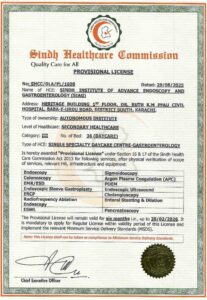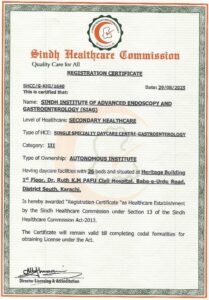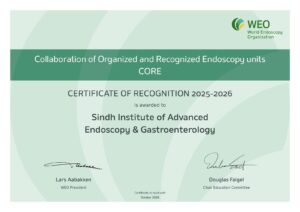Colonoscopy
What is it?
Colonoscopy is a procedure in which a long, flexible camera is used to examine the inside of your large intestine. It helps detect polyps, inflammation, ulcers, and early signs of colon cancer.
Why is it done?
- Blood in stool
- Long-term constipation or diarrhea
- Cancer screening
- Abdominal pain
- Family history of colon cancer
Duration & Recovery Time
- Procedure duration: 30–45 minutes
- Recovery time: 1–2 hours; usually home the same day
Before Your Procedure
Diet: Clear liquids only (water, clear juice, broth) 24 hours before. Avoid red/purple drinks.
Take bowel prep medication as instructed.
Stop blood thinners if advised.
After Your Procedure
Diet: Resume regular diet if no polyps removed. If polyps were removed, stick to soft, bland foods for 1–2 days (e.g., rice, bananas, khichdi). Avoid spicy or heavy meals.
Rest & Activity: Rest the day of procedure. Resume regular activities the next day.
Medications: Resume medications as advised by your doctor. Confirm when to restart blood thinners.
Hygiene: No wound care needed.
Follow-up: If biopsies or polyps were taken, follow up in a few days for results.
Complications may include:
- Bleeding (especially after polyp removal)
- Infection (rare)
- Colon injury (very rare)
See your doctor immediately if you have:
- Heavy rectal bleeding
- Severe abdominal pain
- Fever or chills
- Dizziness or weakness
Not Suitable For (Tell Your Doctor If…)
- Severe heart or lung disease
- Known bowel perforation or blockage

Colonoscopy Procedures List
| POLYPECTOMY |
| APC |
| COLONIC DILATATION |
| COLONIC SEMS |
| EMR |
| ESD |
Patient Frequently Asked Questions
You’ll usually receive light sedation to keep you comfortable.
Most people feel mild cramping or gas, not pain.
Yes, usually after a few hours. Start slow.
Yes, due to sedation you should not drive for 24 hours.
Yes, it is generally very safe. Complications are rare.




